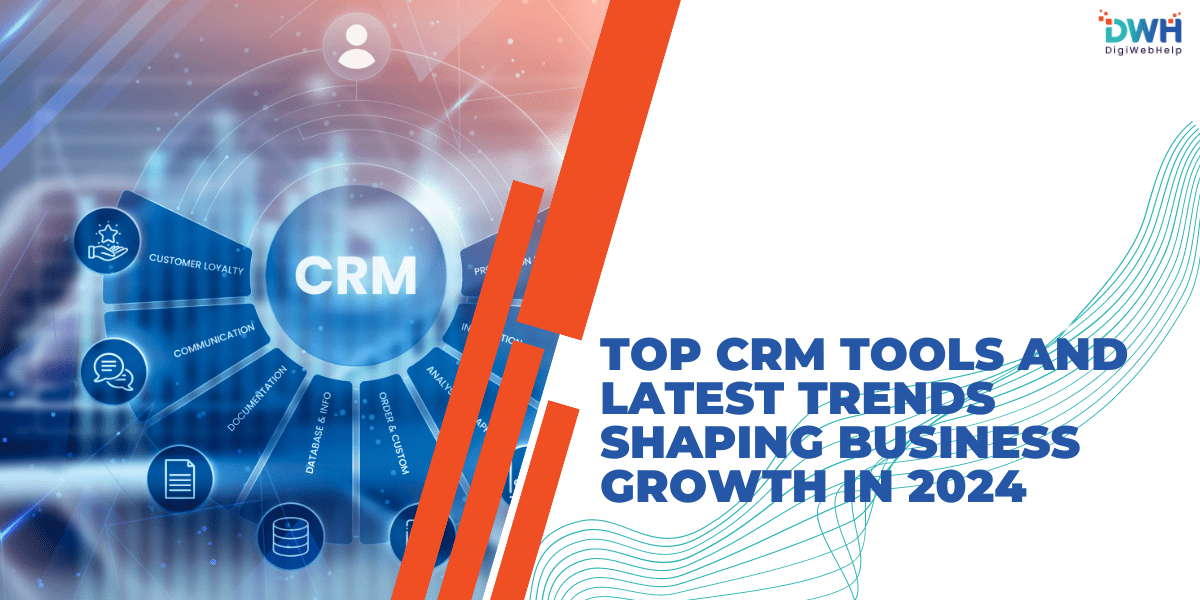
Top CRM Tools and Latest Trends Shaping Business Growth in 2024
CRM, or Customer Relationship Management tools, have become a cornerstone of modern business strategy. They help businesses of all sizes manage interactions with their customers, streamline processes, and drive growth. As businesses continue to focus on providing customized customer experiences and making data-driven decisions, the demand for advanced CRM solutions is rising.
In 2024, CRM tools are more critical than ever, offering innovative features that extend further than simple customer management. In this blog, we explore the major CRM tools shaping the market and examine the latest trends in CRM technology driving business growth.
Emerging CRM Tools for 2024
With continuous technological advancements, the CRM landscape is becoming increasingly competitive. Here are some top CRM tools setting the standard for 2024.
Leading CRM Tools
1. Salesforce
Salesforce has long been recognized as one of the leading CRM tools. It offers a comprehensive array of features that cater to businesses of all sizes.
Key Features:
- AI-powered Analytics: Salesforce Einstein provides predictive analytics based on data, assisting companies in making informed decisions.
- Customization: Salesforce’s modular design allows businesses to customize their CRM to fit their specific requirements.
- Scalability: Salesforce can quickly scale with your business, making it ideal for growing enterprises.
- Seamless Integration: Salesforce allows simplified integration with third-party applications through its AppExchange marketplace.
2. HubSpot
HubSpot CRM is known for its user-friendly interface and seamless integration with marketing tools. It’s a popular choice for small and medium-sized businesses.
Key Features
- Marketing Automation: HubSpot’s CRM integrates well with its marketing hub. It offers tools for email marketing, social media, and content management.
- Free CRM: HubSpot offers its robust CRM tool for free, which is especially attractive to startups and small businesses.
- Sales Pipeline Management: HubSpot’s visual dashboard helps teams in keeping tabs on deals, performance, and activities.
3. Zoho CRM
Zoho CRM is gaining popularity as one of the best CRM tools for companies looking for a budget-friendly yet powerful solution.
Key Features
- AI Assistant (Zia): Zoho’s AI-driven assistant helps automate tasks, analyze data, and predict customer behavior.
- Multi-Channel Communication: Zoho CRM supports communication via email, social platforms, live chat, etc.
- Personalization and Integration: Zoho CRM offers extensive integration with over 500 third-party apps.
Comparison of CRM Tools
When evaluating the best CRM tools for your business, it is essential to consider how each tool aligns with your business needs and goals. Salesforce stands out for its customization and scalability. This makes Salesforce a preferred choice for large enterprises with intricate CRM needs. Its vast array of applications and integrations lets businesses tailor the platform precisely to their requirements, but mastering customization may require a steeper learning curve and higher costs.
On the other hand, HubSpot’s user-friendly interface and seamless integration with marketing tools make it ideal for smaller and mid-sized businesses, aiming to integrate their sales and marketing efforts. Its intuitive design and free CRM services are beneficial for startups and small businesses, while still providing robust features as businesses grow.
Zoho CRM offers a balance between affordability and functionality, catering to small and mid-sized businesses needing a budget-friendly solution without compromising with key features. Zoho’s AI assistant, Zia, and multi-channel communication options make it a versatile tool for businesses wanting to boost customer engagement on varied platforms.
Latest Trends in CRM Technology
Several key trends are emerging in CRM technology in 2024, reflecting a shift towards greater automation, integration, and personalization.
- AI and Automation
Artificial Intelligence and automation are revolutionizing how businesses interact with their customers. Tools like Salesforce and Zoho CRM are now integrating AI features like chatbots and predictive analysis. These features help businesses anticipate customer needs and automate routine tasks. These AI-driven insights help businesses add a personal touch to each customer interaction. This boosts customer satisfaction and retention.
- Integration with Other Technologies
Integrating third-party tools is another crucial trend in CRM technology. Businesses are increasingly seeking CRM tools that can seamlessly integrate with other platforms. This includes marketing automation tools, social media, and data analytics software. HubSpot, for example. Excels in integrating CRM with marketing platforms. This lets businesses integrate their customer data and marketing strategies. The integration improves their ability to deliver consistent and personalized experiences across multiple channels.
- Enhanced Customer Experience
Businesses are centrally focused on providing an excellent customer experience. Modern CRM tools incorporate features that facilitate personalized interactions, such as a real-time feedback system and customer journey mapping. These tools enable businesses to better understand customer preferences, tailor their offerings, and create memorable experiences that promote loyalty.
- Mobile CRM
Mobile CRM is now vital due to the growing need for mobility. Sales teams and customer service representatives need to access CRM data while on the go. Tools like Salesforce and Zoho CRM offer robust mobile apps that enable access to important customer information, regardless of location. This trend is crucial for companies with remote or field-based teams. It enhances work productivity and responsiveness.
How CRM Tools Are Shaping Business Growth
CRM tools are no longer just about managing customers anymore. They are pivotal in driving business growth. These tools use AI, automation, integration, and other innovative features to streamline business operations and reduce costs.
CRM tools enable better decision making through real-time data and insights. This is crucial for developing effective business strategies. Moreover, these tools provide better customer experience to enhance customer satisfaction and build stronger customer relationships. This leads to increased loyalty and lifetime value.
Future Outlook for CRM Tools
Looking forward, we can expect CRM tools to continue to evolve and integrate advanced features and capabilities.
- Predictions for CRM Evolution
In the future, we can expect further advancements in AI and machine learning in CRM tools. This will lead to even more detailed insights into customers and better automation. Also, technology like the Internet of Things (IoT) and blockchain may become more prevalent. These technologies can bring new ways to manage and safeguard customer data.
- Preparing for Future Trends
Staying competitive requires constant updates to new tech trends. It is important to invest in the right CRM tools and train employees to use them properly. Companies must keep an eye on emerging trends and be ready to integrate new features and technologies into their CRM strategies.
Conclusion
The landscape of CRM tools in 2024 is evolving, with AI, automation, and integration playing a key role. Businesses looking for the best CRM tools are intrigued by these trends. The tools that integrate these emerging trends are well-positioned to drive business growth. These tools enhance customer satisfaction and help businesses stay competitive in the rapidly evolving market.










